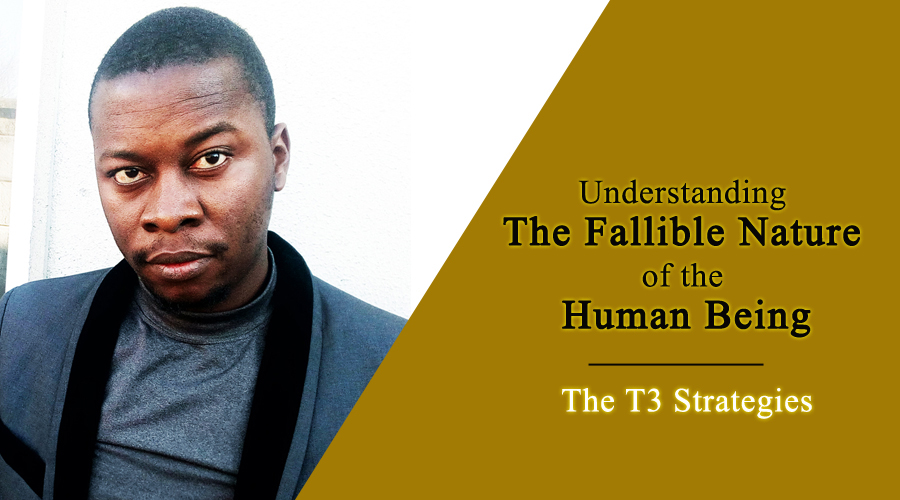I woke up with a question planted in my brain, it wouldn’t let me focus on my usual routine. Instead, it wants my attention for the whole day on a subject that makes highly intelligent minds go ‘gaga’. It is a question about the fallible nature of the human being. It is a question that kept me thinking throughout the day – the T3.
For the first time, I’m beginning to see how strangely the world is formulated. I could see that there is some good in us but it is very weak. We prioritize our feelings over that of others without bearing in mind how much pain they may suffer. Then, the good in us goes silent.
This accounts for why we make mistakes. Surprisingly, it is inevitable. But, what counts is how you’re able to pick yourself back up from the mistakes you’ve made. When you allow your feelings to override your reasoning, and then you see the effects on you and others, do not allow it to define you.
It has happened. You can not ‘unhappen’ it. However, the only thing you can do is to resolve it. Likewise, accept the judgments that come after you err with a heart of resolution. Do not fight it. Do not debate it. Understand that the human being is fallible.
The wisdom to find in this
Each day comes with its task, test, and timeline. This is what I call ‘the t3’ of the day. If you’re able to recognize the t3 of your day then you’re likely to boost the good in you.
Most times, it is not ‘what’s wrong’ we are afraid to make but the ‘good’. Because the good in us is weak, doing wrong becomes very easy. As a matter of fact, we were well aware of the wrong things that we’ve done or that we do. We knew what we wanted to do is wrong but we do it anyway. Why? Is it because we lack the strength to do what is good?
After a terrible disaster, you’d see families that recovered from it kissing and hugging each other. In the same manner, you’d see people irrespective of nationality, race, religion, tribe coming to help and rescue those who were badly affected. You’d see so much activity of good being demonstrated by people regardless of their differences. Then, after some days, they’d forget about it.
Does this mean bad things must happen to us before we can see the good in us? Do we need to have bad times before we can appreciate what is good?
‘The t3’
If you’re able to recognize the t3 of your day then you’re likely to boost the good in you.
Godfrey Jeremiah
The ‘t3′ or ‘t3‘ is a combination of task, test, and timeline. If you’re able to identify these parameters, you’d relatively avoid certain mistakes caused as a result of your fallible nature.
You should:
- Know and define your task for each day. There is something you must do to contribute to humanity. You have been given an assignment for this day. If you think you do not have or can not identify your assignment for the day, create one! Start with a to-do-list. Then recognize the objectives or goals of the task: What does it seek to achieve or contribute to humanity?
- Understand that you’re being tested each day and choose to pass the test. In a sense, we are all here to be tested. We must decide to pass the test of being human. This is one of the qualities that make us different from other creatures. Life for humans is a test. However, you may want to ask who is scoring the test. Surprisingly, you are! And then, others around you. This is demonstrated in how your actions affect you and others around you. People do not see or judge intentions but actions. You may have the right intention for your actions, but it is your actions that count.
- Identify it’s your timeline that’s making a story that history would remember you for. What’s the guarantee that you’d live through this day? There is none. What moment must you create this day that you’d want someone to remember you with when you’re gone? It is one thing to be alive and another, to stay alive. Assuming you’re told with all seriousness and evidence that you’d die today, what would you do differently?
What is the human being?
The truth of what the human being is quite a complex debate. We do not fully know the kind of beings we are. We can become whatever we want. Unlike animals, we have the liberty to be anything we want.
For example, fishes can only survive and move with ease in waters. Birds can fly with ease in the air and feed on whatever they find as food. But the human being is given the freedom to decide on anything (s)he wants.
We are self-creating beings. We’re in some sense, autonomous and responsible for ourselves. We are able to change our programming. We can speak a single sentence to a person and change their life. That does not happen to animals. You can’t convince, for example, a mouse to do something differently.
There are still limits to the human person and the anthropology of what kind of creatures we are. But we must filter this liberty of humanity through ethics, philosophy, or maybe a spiritual understanding of what kind of beings we are.
In conclusion, making mistakes is part of being humans. But, we can be better when we treat people with respect and take into account, their feelings. The ‘T3’ strategy would help us go a long way in achieving that. Create your task, identify the test life brings your way in your timeline. Then, you’d debunk the fallible nature of the human being.



